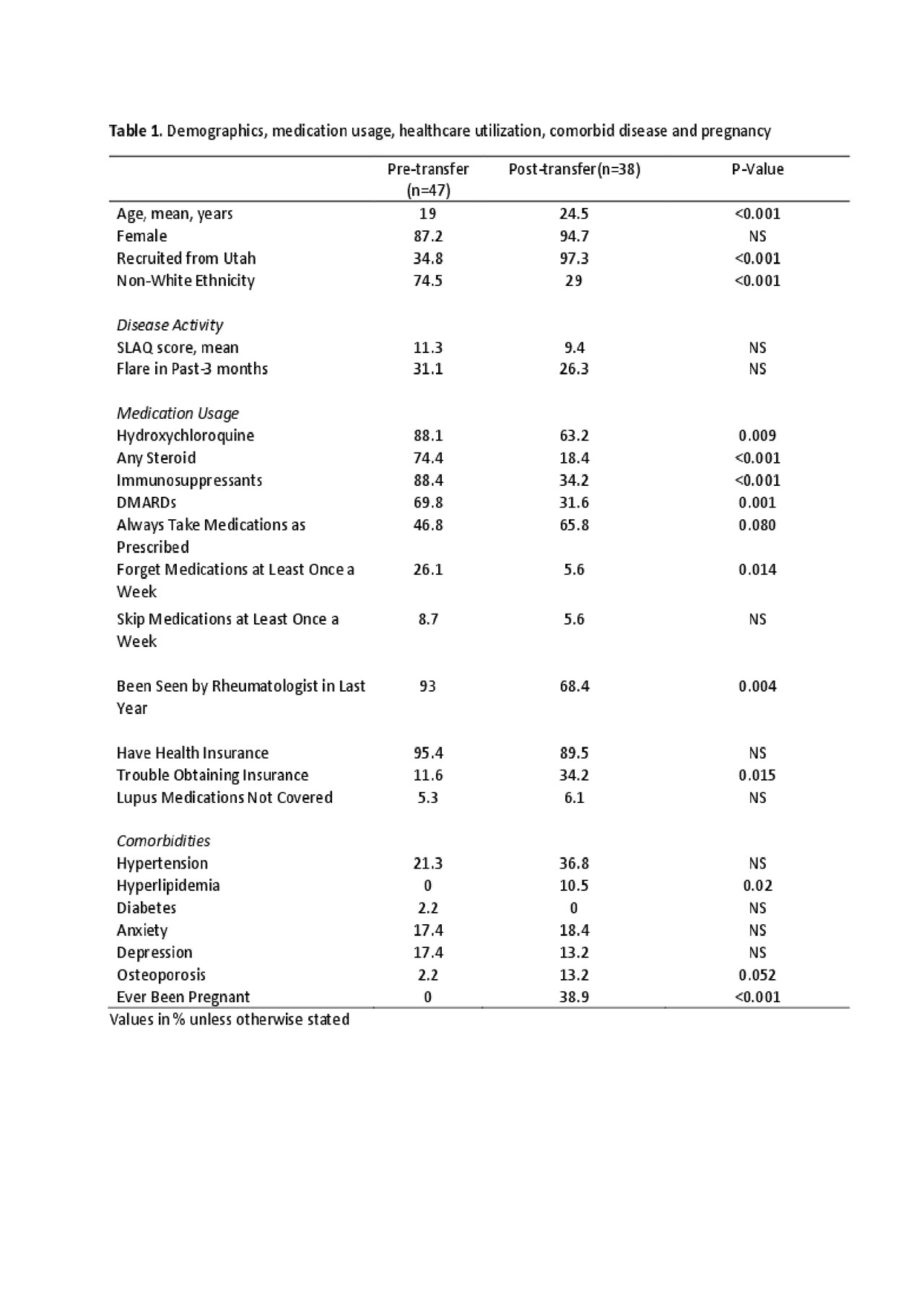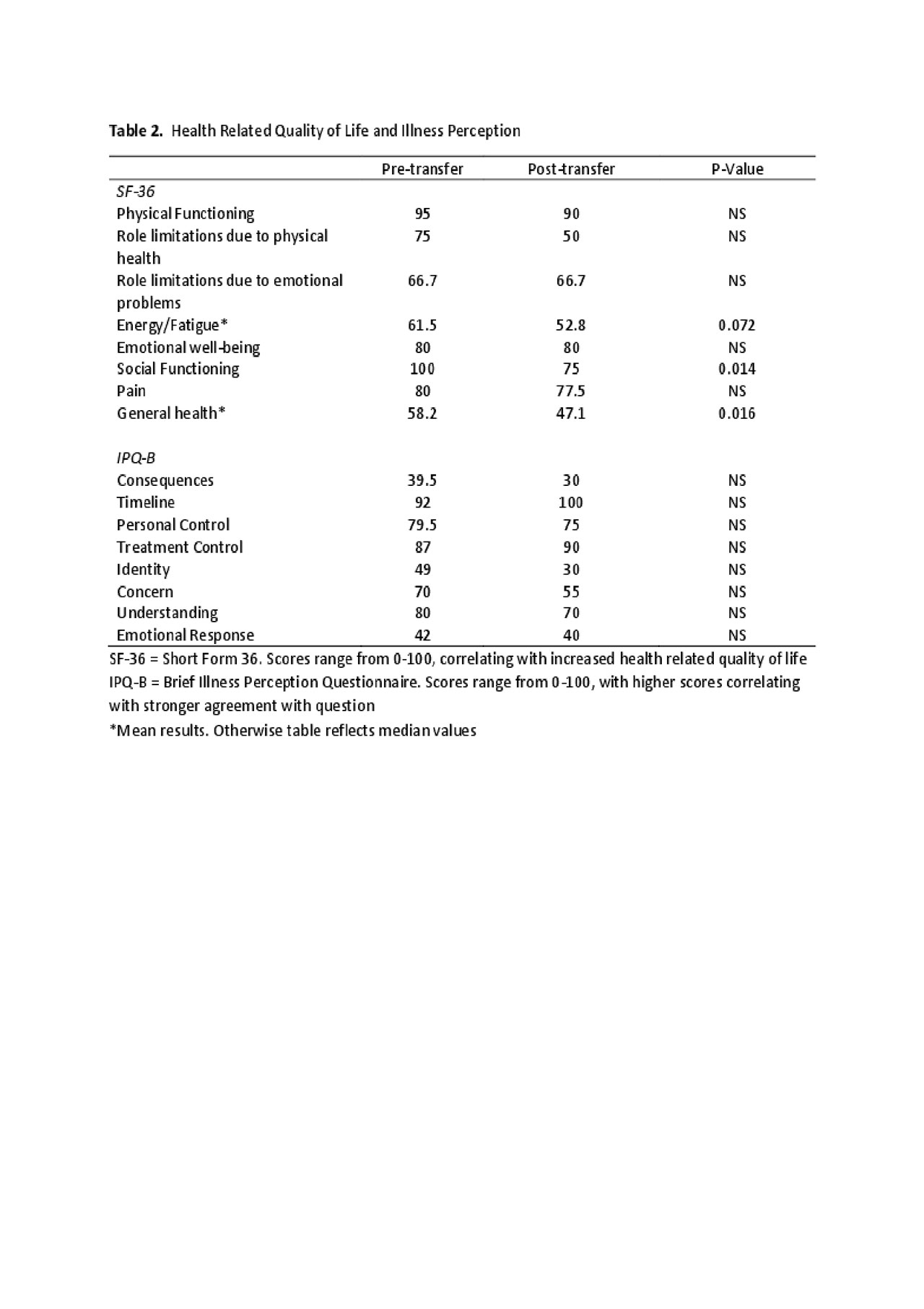Session Information
Date: Monday, November 11, 2019
Title: Pediatric Rheumatology – ePoster II: SLE, Juvenile Dermatomyositis, & Scleroderma
Session Type: Poster Session (Monday)
Session Time: 9:00AM-11:00AM
Background/Purpose: Individuals with childhood-onset systemic lupus erythematosus (cSLE) must transfer from pediatric to adult health care as they enter adulthood. Previous analyses of the Pediatric Lupus Outcomes Study demonstrated significantly lower rates of medication usage and more frequent gaps in rheumatology care in a post-transfer cohort compared to a pre-transfer group, in spite of similar levels of disease activity. This study aims to further explore these findings by comparing transition readiness, illness perceptions, comorbid conditions, pregnancy, and insurance barriers to obtaining medication.
Methods: Data derived from the baseline interview of the Pediatric Lupus Outcomes Study, an annual telephone survey of 91 English- and Spanish-speaking participants age 18-30 with confirmed cSLE. Subjects were recruited from rheumatology clinics. To define a cohort undergoing transition from pediatric to adult care, we included respondents who received care from a pediatric rheumatologist currently or in the past (N=85). Transition readiness and illness perception were assessed using Transition Readiness Questionnaire (TRAQ) and Brief Illness Perception Questionnaire (IPQ-B). Patients answered questions related to medication compliance, insurance barriers, comorbidities, and reproductive health. Bivariate analyses were used to compare individuals currently cared for by pediatric vs adult rheumatologists.
Results: Mean age was 21 years; mean age at diagnosis was 13 years. 38 respondents (45%) had transferred to adult care. Post-transfer patients were more likely to report 100% medication compliance than the pre-transfer group (66 vs 47%), which neared significance. Pre-transfer patients were more likely to forget to take medications (26 vs 6%). Post transfer patients had significantly higher incidence of hyperlipidemia (11 vs 0%) and a trend towards higher incidence of osteoporosis (13 vs 2%). The rate of pregnancy was higher in the post-transfer (39%) vs pre-transfer (0%) patients. The post-transfer group scored lower on General Health (47 vs 58) and Social Functioning (75 vs 100) metrics of the Short-form 36 health survey. The post transfer group had significantly higher overall TRAQ scores (4.8 vs 4.4), with higher scores in the appointment keeping (5 vs 3.9) and medication management (4.8 vs 4.3) sub-categories.
Conclusion: Both post- and pre-transfer groups demonstrated similar disease perceptions and quality of life, while the post-transfer group reported higher transition readiness. While previous findings showed that decreased immunosuppressant use in the post-transfer group could not be explained by differences in disease activity, this difference in medication utilization could be explained by higher pregnancy rates and medication side-effects/comorbidities. Despite lower rates of medication usage the post-transfer group reported better medication compliance, which may reflect both different prescribing practices between pediatric and adult providers and expected developmental changes during adulthood. Future studies will use longitudinal data to assess changes in disease activity and healthcare utilization as pre-transfer patients move to adult rheumatology care.
To cite this abstract in AMA style:
Haro S, Lawson E, Hersh A. Disease Activity and Health Care Utilization Among Young Adults with Childhood-onset Lupus Transitioning to Adult Care: Follow-Up Data from the Pediatric Lupus Outcomes Study [abstract]. Arthritis Rheumatol. 2019; 71 (suppl 10). https://acrabstracts.org/abstract/disease-activity-and-health-care-utilization-among-young-adults-with-childhood-onset-lupus-transitioning-to-adult-care-follow-up-data-from-the-pediatric-lupus-outcomes-study/. Accessed .« Back to 2019 ACR/ARP Annual Meeting
ACR Meeting Abstracts - https://acrabstracts.org/abstract/disease-activity-and-health-care-utilization-among-young-adults-with-childhood-onset-lupus-transitioning-to-adult-care-follow-up-data-from-the-pediatric-lupus-outcomes-study/



